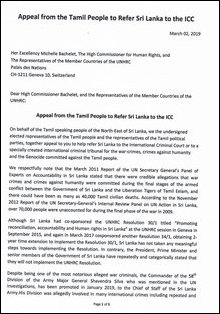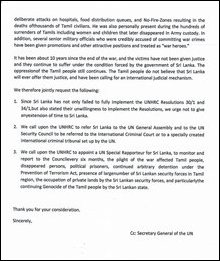
Tamil parties failing to single-mindedly demand genocide justice, more dangerous than ITAK
[TamilNet, Wednesday, 13 March 2019, 14:11 GMT]
The Eezham Tamils need to objectively and scientifically distinguish the competing discourses of the collaborative politics of the ITAK and the actors claiming to counter the wrong narrative of the ITAK. While the ITAK is lost to ‘quisling politics’, there is a danger that the emerging alternative actors also succumbing to a rather dangerous ‘diplopia politics’, which is a double-option trap. The bedrock of both the deceptions is the overt orientation of relying upon the Geneva-based UN Human Rights Council (UNHRC) and the Office of the High Commissioner of Human Rights (OHCHR), tasked to promote and protect the human rights and function also as the secretariat of the UNHRC. It is important that Tamils should engage and interact with UN bodies. However, limiting the demands to the inside-the-box thinking of that system is more disastrous than the ITAK advocating quisling politics.
The democratically elected Northern Provincial Council, under the leadership of Justice C.V. Wigneswaran, passed a resolution in February 2015 urging the UN OHCHR Investigation on Sri Lanka (OISL) to investigate the claim of genocide and recommend appropriate investigations and prosecutions by the International Criminal Court.
The NPC resolution also referred to the findings of the Permanent Peoples’ Tribunal on Sri Lanka (PPT).
The Assembly of Tamil Nadu and the late Chief Minister of Tamil Nadu Ms Jayalalithaa in March 2013 unanimously passed a resolution demanding the UN Security Council to conduct a referendum among Eezham Tamils in the island as well as in the diaspora on the question of Separate Eelam. Already in June 2011, Tamil Nadu Assembly had unanimously passed a resolution demanding international investigations on genocide through ICC.
Apart from the dormant ITAK operating against the NPC resolution, all the other actors were backing the NPC resolution at that time.
However, these demands are now being slowly watered-down with multiple options in a sophisticated manner, Tamil activists for alternative politics in Jaffna told TamilNet this week.
* * * All the parties, except the collaborating ITAK, have openly called the UNHRC not to provide extension time to the SL State anymore and to refer the SL State to the ICC or a specially created international criminal tribunal through the UN system.
The constituent parties of the TNA, except the ITAK, have drafted a common position.
The EPRLF, TELO, PLOTE and the TULF agree with Justice C.V. Wigneswaran's TMK in the demands mentioned above.

Common position of EPRLF, TELO, PLOTE, TULF and TMK (page 1/2)

Common position of EPRLF, TELO, PLOTE, TULF and TMK (page 2/2)
They are also seeking to open UNHRC offices in the North and East to monitor the ongoing crimes.
The Tamil National People's Front, which is not part of the TNA, has expressed its position very sharply.
“When Sri Lanka has so consistently rejected the need for such criminal accountability, which has been one of the main pillars on which all country-specific resolutions on Sri Lanka have been justified, it is amply clear that the UNHRC is not going to be able to deliver on criminal justice for the predominantly Tamil victims. To point to other matters on which the government has shown token action as progress, and perpetuate the facade of commitment of Sri Lanka is not only dishonest but also sinister,” said Gajendrakumar Ponnambalam who addressed the UN Human Rights Assembly.
“Accordingly our organization wishes to continue to reiterate, that a referral of Sri Lanka to the International Criminal Court or by the setting up of an ad-hoc international criminal tribunal will be the only ways of securing justice for the predominantly Tamil victims in Sri Lanka,” he concluded in his direct address to the council.
Justice C.V. Wigneswaran, in a statement issued on 25 February said: “If further time is granted to Sri Lanka to execute the contents of the Resolution of the UNHRC this year it would amount to not only cheating our affected people but also UNHRC deceiving itself.”
“At the close of the war when our people were killed in thousands and genocide was committed, the UN and the International Community failed in their Responsibility to Protect (R2P) our people,” he rightfully observed.
“In the light of the President of this Country having openly said that many of the contents of the Resolution including War Crimes Inquiry would not take place, the constituent International member countries and the High Commissioner of the UNHRC must ask themselves the purpose of granting further time and decide to take alternative steps in this regard,” he further said in his statement.
There is a crucial difference between the positions of the TNPF and that articulated by C.V. Wigneswaran's TMK. It is the position on ‘alternative steps’.
“In the light of the President of this Country having openly said that many of the contents of the Resolution including War Crimes Inquiry would not take place, the constituent International member countries and the High Commissioner of the UNHRC must ask themselves the purpose of granting further time and decide to take alternative steps in this regard. That is why we have requested that the ICC should handle the Sri Lankan matter. If that is not possible for any reason, we have suggested through the Tamil Peoples’ Council that appropriate steps in accordance with the principles and procedures laid down in International Law should be taken by the UNHRC to formulate an appropriate mechanism to deal with this matter.”
Knowingly or unknowingly, the former NPC Chief Minister is getting into a terminology trap.
The TPC's position was sent to UN General Secretary on 26 February, according to Wigneswaran. He is a co-chairman of the TPC (The annual report of the UN High Commissioner for Human Rights was finalised much earlier on 08 February).
Wigneswaran, who is now in the process of forming and shaping Tamil Makkal Koottani (TMK), which seeks to become an alternative to the ITAK, should seriously consider sticking to the single-mindedness of the NPC resolution, which he tabled and passed with courage, conviction and statesmanship four years ago in 2015.
Similarly, the grassroots activists should double their efforts in bringing the TNPF and the newly formed TMK to join hands based on a policy understanding. This also applies to other constituent parties of the TNA.
Gajendrakumar Ponnambalam, one of the eleven founding members of the North-East Secretariat of Human Rights (NESoHR) during the peace process, is well versed in international human rights related position of Eezham Tamils.
However, the TNPF distancing from other actors in forming a joint alternative political alliance has also disappointed the activists for alternative politics among the Eezham Tamils.
* * * Many international human rights actors have recognised the genocide being waged by the extremist sections of the Theravada Buddhists in Myanmar as genocide.
The Eezham Tamils who have faced the same intent for decades in the island from the Mahawansa-mindset based ideology must now double their efforts in seeking justice to the genocide particularly with a focus on documenting and establishing the ‘intent’ of the genocide and state-responsibility.
Apart from demanding ICC or a specially constituted international criminal tribunal by the UN to investigate the genocide, Eezham Tamils and their political actors should also consider finding a state actor to engage the International Court of Justice to examine SL state's decades-old responsibility in Tamil genocide, before, during and after the war.
Francis Boyle, an expert in international law and a professor at University of Illinois College of Law, has outlined how this could be done the Tamil diaspora,
ten years ago in March 2009. Professor Boyle single-handedly won two World Court Orders in favour of the Republic of Bosnia and Herzegovina against Yugoslavia to desist from committing all acts of genocide against the Bosnians.
* * * There is a deep-rooted connection between the sovereignty conflict and genocide in the island.
The protracted genocide is the tactic of this strategy, which seeks to retain and consolidate the sovereignty and self-determination of the entire island as exclusive only to Theravada Sinhala Buddhists.
Again, this strategy of the Sinhala polity is subordinated to the ultimate ‘grand’ vision, which is the ‘authentication’ of a Sinhala ‘civilisation’ in the island.
The vision is not scope-limited to the island alone. It wants to be supremacist in a broader geographical and maritime context of South India and the heart of the Indian Ocean.
The only way to enforce a change in the Sinhala establishment is Eezham Tamils acting according to their independently-evolved vision, which is not reactionary or merely a counter-thesis to that of the Sinhala ‘civilisational’ discourse.
Eezham Tamils and the forces of solidarity without vested interests (as those behind the Dublin and Bremen hearings of the PPT) as well as the natural allies in Tamil Nadu, must collectively own the strategies and tactics.
Realising the geo-politics inflicted international injustice is also an unavoidable and integral part of charting this independent discourse. It is also crucial for the solidarity movement.
Ten years have elapsed since the genocidal onslaught, and the heritage genocide is accelerating as never before.
Those not articulating the policy clearly on Tamils sovereignty, the intention aspect of the Tamil genocide and stick to the language of the UN Human Rights system, need to be course-corrected by the enlightened sections of the grassroots.
It is time to get out of the ‘inside-the-box’ paradigm and form a much broader alliance to counter the quislings and to course-correct other detracting tendencies.
Related Articles:07.12.18
Washington set to downgrade ‘human rights politics’ to assoc.. 04.12.18
USA wants India and Japan to look after smaller states in IO.. 26.11.18
Sinhala ethnocracy's entrenched insecurity, ultimate spoiler.. 10.11.18
Obama,Clinton, Power accountable for protracted genocide hau..
Chronology:









